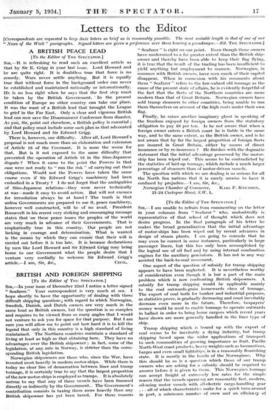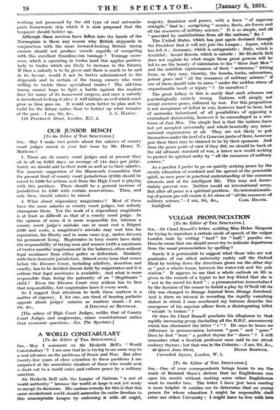[To the Editor of TI1E SPECTATOR.] SIR,--I am unable to
refrain from commenting on the letter in your columns from " Seafarer " who, undoubtedly is representative of that school of thought which does not desire progress. • In the final paragraph of his letter he makes the broad generalization that the initial advantage of motor-ships has been wiped out by recent advances in design of steam plants. I am going to concede that he may even be correct in some instances, particularly in large passenger liners, but this has only been accomplished by the logical use of oil fuel and by using internal combustion engines for the auxiliary generators. It has not in any way assisted the back-to-coal movement.
One aspect of the question of subsidy for tramp shipping appears to have been neglected. It is nevertheless worthy of consideration even though it is but a part of the main problem which is now confronting British shipowners. A subsidy for tramp shipping would be applicable mainly to the coal outwards-grain homewards class of tonnage. The export of coal both for bunker and industrial purposes, as statistics prove, is gradually decreasing and must inevitably decrease even more in the future. Therefore, taxpayers' money would be used to enable tonnage to operate outwards in ballast in order to bring home cargoes which recent years have 'shown are more generally handled in the liner type of ship.
Tramp shipping which is bound up with the export of coal seems to be inevitably a dying industry, but tramp shipping based upon the wider applications of transport to such commodities of growing importance as fruit, Pacific North-West coast products, heavy weights such as locomotives, barges and even small lightships, is in a reasonably flourishing state. It is mostly in the hands of the Norwegians. Why this should be so is a question which those of our tramp owners who are asking for a subsidy should be required to answer before it is given to them. This Norwegian tonnage can accept freight at extremely low rates -for the simple reason that the vessels operating are reasonably fast, modern, oil-using motor vessels with all-electric cargo-handling gear . . . all of which characteristics make for a quick turn-around in port, a minimum number of crew and an efficiei cy of
working not possessed by the old type of coal outwards:- grain homewards ship which it is now proposed that the taxpayer should bolster up.
Although thee services have fallen into the hands of the Norwegians is. there any reason why British shipyards in conjunction with the more forward-looking British tramp Owners should not produce vessels capable of competing with this excellent Scandinavian tonnage ? Tonnage more- over, which is operating in trades. (and this applies, particu- larly to trades which are likely to increase in the future). If then a subsidy is to be given and there is much to be said in its favour, would it not be better administered to the shipyards and to certain of the tramp owners who were willing to tackle these specialized trades ? The old-time tramp cannot hope to fight a battle against the modern liner for many of its homeward cargoes, and once a, subsidy is introduced to keep it alive it will initiate an evil which must grow as time goes on. It would seem better to plan and to build for the future rather than to bolster up what remains of the past.—I am, Sir, &c., A. C. HARDY. 10 Fenehurch Street, London, E.C. 3.







































 Previous page
Previous page